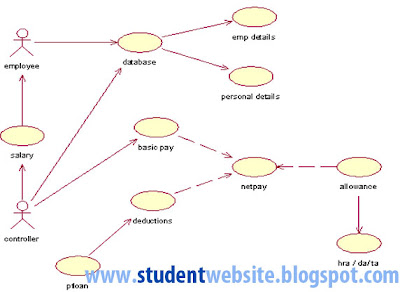OBJECTIVES:
To analyze the problem gather the requirements and implement payroll processing system and to model the data using UML diagram.
Phase 1: Problem analysis:
The employee details and department details are stored in a database. The basic pay for each employee is obtained from the department and processed by controllers. The attribute such as HRA, DA, TA, loan arrears are go to for each employee which is used for calculating the net pay for each employee the controller who process all the details then provides a salary report to employees.
Phase 2:
Functional Requirement analysis:
The user shall be able to search either or all the initial set of databases or select a subset from it. Each employee is in provided with an unique employee id with this the retrieval of data from the database will be early.
Identifying actors and usecases:
ACTORS
1.employee
USECASE
Database
Salary
ACTORS
2.controller
USECASE
Database
Netpay
Deductions
Phase 3:
The various data modeling techniques which are implemented in the payroll processing system are
Usecase diagram
Class diagram
Collaboration diagram
Sequence diagram
State chart diagram
Activity diagram
Component diagram
Phase 4:
The software is now designed in rational rose and skeleton code is generated in VBC++
Phase 5:
Implementation:
Use case diagram


To analyze the problem gather the requirements and implement payroll processing system and to model the data using UML diagram.
Phase 1: Problem analysis:
The employee details and department details are stored in a database. The basic pay for each employee is obtained from the department and processed by controllers. The attribute such as HRA, DA, TA, loan arrears are go to for each employee which is used for calculating the net pay for each employee the controller who process all the details then provides a salary report to employees.
Phase 2:
Functional Requirement analysis:
The user shall be able to search either or all the initial set of databases or select a subset from it. Each employee is in provided with an unique employee id with this the retrieval of data from the database will be early.
Identifying actors and usecases:
ACTORS
1.employee
USECASE
Database
Salary
ACTORS
2.controller
USECASE
Database
Netpay
Deductions
Phase 3:
The various data modeling techniques which are implemented in the payroll processing system are
Usecase diagram
Class diagram
Collaboration diagram
Sequence diagram
State chart diagram
Activity diagram
Component diagram
Phase 4:
The software is now designed in rational rose and skeleton code is generated in VBC++
Phase 5:
Implementation:
Use case diagram

Class Diagram

Collaboration diagram








